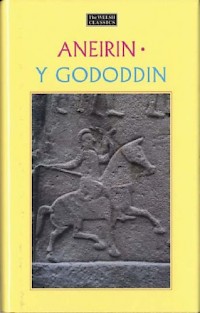Unusual witness of war II: The Gododdin
 ““Ceredig, amiable leader,
““Ceredig, amiable leader,
A wrestler in the impetuous fight;
His golden shield dazzled the field of battle,
His lances, when darted, were shivered into splinters,
And the stroke of his sword was fierce and penetrating;
Like a hero would he maintain his post”
Aneirin - Y Gododdin XXIX-1-6
edited by J. Williams and W. Rees.
Hi everyone,
A while ago, I wrote a blog about an unusual war witness: the Book of Kells. This one is a bit more ‘usual’ than the last one, but still special: the Gododdin: a Britonic poem, written by the poet Aneirin.
This poem originates somewhere in the sixth century. The oldest surviving text we have, however, dates from the twelfth century. It relates the story of the battle of Catterick at the end of the sixth century where three hundred soldiers fought as payment to a local lord in return for feasting for a whole year. In the end, they all died except the poem’s author. Besides the epic tale, the poem is special for other reasons as well: it’s the earliest literary mention of the famous King Arthur, and therefore can be taken as evidence that he was already well-known in Dark Ages.
After the Romans formally left Britain in the early fifth century, power fell into the hands of local lords and kings. Britain consisted of several independent small kingdoms and tribes who fought sometimes with, and sometimes against each other. At the same time and for the next few centuries, Britain suffered from invasions by other tribes, such as the Saxons. It was a time of many battles and much uncertainty.
Besides a historical and literary source, The Gododdin was the basis for Rosemary Sutcliff’s book The Shining Company which was published in 1990. Sutcliff also wrote books about the Romans, which were read by a young boy who, when he grew up, made both his children fall in love with history. His oldest one eventually became the editor of Medieval Warfare. That’s right, my dad made me fall in love with history, Celtic myths and sagas, and Arthurian tales. I got to know of the Gododdin later though, during my first year of college, but I’ve still not lost interest in it ever since.
Besides being a witness of war, the Gododdin turned out to be much more. The text was inspired by heroes and was about heroism. It also mourns fallen soldiers, which makes it relatable to everyone who’s lost people because of war violence. This is what I find special about history and stories. They start to be one thing, but this changes over time. People find or create new interpretations, which changes how we see them. What the original version was, that’s up to us, historians and people who love history, to find out.
